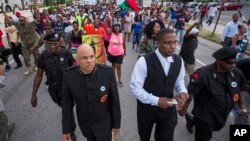Last week’s tragic mass shooting at a black church in Charleston, South Carolina, has propelled the issue of race into the early stage of the 2016 presidential campaign.
At a campaign event in Florissant, Missouri, Democratic presidential candidate Hillary Clinton described last week’s tragedy in Charleston as “an act of racist terrorism perpetrated in a house of God.”
Clinton said that in the wake of Charleston, it has become clear that “equality, opportunity and civil rights in America are still far from where they need to be.” She added, “I know it is tempting to dismiss a tragedy like this as an isolated incident, to believe that in today’s America bigotry is largely behind us and that institutionalized racism no longer exists. But despite our best efforts and our highest hopes, America’s long struggle with race is far from finished.”
Clinton said the Confederate flag is a symbol of the nation’s racist past and should not fly anywhere. The alleged shooter, Dylann Roof, had posed with the flag in photos, and the South Carolina legislature is now considering removing it from the state capitol grounds.
Fellow Democratic contenders Bernie Sanders and Martin O’Malley have also called for the Confederate flag to be pulled down from flagpoles around the country and relegated to museums.
African-American voters were a key part of the Democratic coalition that helped elect Barack Obama president twice.
Varied Republican response
Some of the Republican presidential contenders were quick to condemn the Charleston shootings, including former Florida Governor Jeb Bush.
“It just breaks my heart and I know it breaks your heart as well, and we need to find ways to bring love back into our society,” he said.
Bush and several other Republican contenders applauded South Carolina Governor Nikki Haley’s call for the Confederate flag to come down, but they were criticized for waiting to speak out about the flag until after the Republican governor made her appeal.
Ben Carson, the only African-American in the Republican field, said the Confederate flag should come down, even though he said he understood both sides in what has become a divisive debate. Carson said keeping the flag in place “offends such a large portion” of the country. But he added that taking it down “also offends a large portion. I want to stop that. I want the American people to realize that we are not each other’s enemies.”
Other Republican contenders said the Confederate flag is an issue for the people of South Carolina to decide, including former Pennsylvania Senator Rick Santorum and former Arkansas Governor Mike Huckabee.
“But for those of us running for president, everyone is being baited with this question as if somehow that has anything to do whatsoever with running for president, and my position is it most certainly does not,” Huckabee said on NBC’s "Meet the Press."
Political fallout for 2016
The massive national and international attention on the Charleston tragedy and the renewed focus on race, violence and guns in the U.S. suggest those issues will resonate in next year’s presidential campaign.
Democrats are likely to keep the focus on issues like gun control and race relations, while many of the Republican contenders will be looking to support constructive steps without alienating conservative voters in the early primary states. South Carolina traditionally holds the third contest in the presidential nominating schedule, behind Iowa and New Hampshire.
Tom DeFrank, a veteran political analyst with the National Journal, was a recent guest on VOA’s "Issues in the News" program. DeFrank said the Charleston tragedy and others like it that have taken place in recent years show the country still has work to do when it comes to race relations.
“It is just a reminder that 51 years after [President] Lyndon Johnson signed the Civil Rights Act of 1964 into law, you cannot legislate people’s hearts and souls, and that there is a lot of hate still out there,” he said.
Public opinion analyst Karlyn Bowman of the American Enterprise Institute said Americans had high hopes for race relations with election of Obama in 2008. She said that while some have become discouraged about race relations in recent years, the unity demonstrated in Charleston in the wake of last week’s tragedy is encouraging.
“I think the outpouring of community involvement and strength suggests that while we do have problems dealing with race relations and with racists overall, there is an enormous amount of goodwill, good feeling and positive views as we saw in Charleston about the way that community has responded,” she said.





